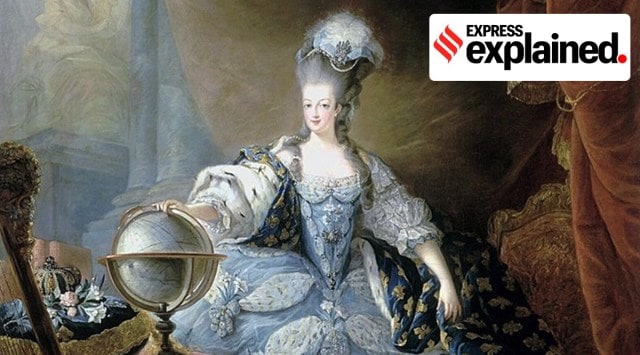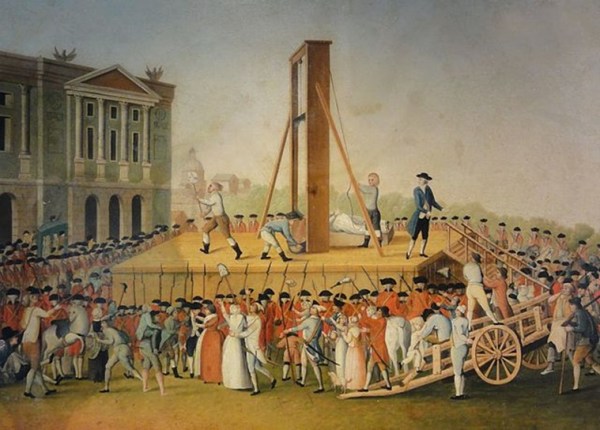One of the key figures of the Revolution was Marie Antoinette, the much-reviled Queen of France, who is still evoked as the epitome of insensitive profligacy. The statement that best sums up the Queen’s callously oblivious personality is “Let them eat cake”.

Just last year, both Finance Minister Nirmala Sitharaman and TMC MP Mahua Moitra were taunted with Marie Antoinette’s name, Moitra over her expensive handbag and Sitharaman over a speech she made in Parliament. About Sitharaman, Congress MP Gaurav Gogoi tweeted, “…At a time of back-breaking inflation and record price rise, such speeches are vulgar and the epitome of Marie Antoinette “let them eat cake”.
But did Marie Antoinette ever actually say this? If not her, who did, and why does it continue to stick to her? We explain.
What exactly is the quote?
In the late 18th century, France was in deep economic crisis. When Marie Antoinette’s husband, Louis XVI, inherited the throne in 1774, the treasury was already depleted, in a large part due to the decadence and corruption of the Paris elite. Louis XVI providing help to the Americans in their war of independence against the British did not help matters.
In the 1780s, crops failed and prices rose to such an extent that even bread became unaffordable for many. It is in this context that the Queen, when told her subjects could not afford the staple food of bread, is believed to have said, then “let them eat cake”. The massive folly of the sentence is that the Queen apparently did not know that cake was more expensive than bread, and that people who couldn’t afford the latter could most definitely not buy the former.
The French quote is “Qu’ils mangent de la brioche”, or “Let them eat brioche”, which is a richer form of bread containing butter and eggs.
But did Marie Antoinette actually say it?
There is no historical evidence to suggest that she did. Historians have noted that while Marie Antoinette, born princess of Austria and married to the crown prince of France at mere 14, was indeed used to and loved luxury, she was personally a kind woman.
Story continues below this ad
As an article in the Smithsonian says, “…her many acts of compassion included tending to a peasant gored by a stag and taking in a poor orphan boy and overseeing his education. “She was so happy at doing good and hated to miss any opportunity of doing so,” wrote Madame Campan, the First Lady of the Bedchamber.”
Lady Antonia Fraser, author of Marie Antoinette: The Journey, also writes that the Queen donated generously to charities, and was an intelligent person unlikely to have made such a callous and rather stupid statement.
There is also the fact that this quote has been around much before Marie Antoinette became queen. It was first attributed, with a minor difference (let them eat crust of the pâté, instead of cake) to Marie-Thérèse, a Spanish princess and wife of Louis XIV, an ancestor of Antoinette’s husband.
According to the History Channel, “Over the next century, several other 18th-century royals were also blamed for the remark, including two aunts of Louis XVI.”
Story continues below this ad
The quote got more notoriety after the philosopher Jean-Jacques Rousseau, in his 1766 book Confessions, attributed it to a “great princess”. However, Antoinette was 11 years old when the book came out, and so is unlikely to have been the princess Rousseau was referring to.
Then why is it stuck to Marie Antoinette?
When exactly was the quote hung around Marie Antoinette’s neck is not clear. Some historians believe that it was attributed to her to whip up feelings against the monarchy in the lead-up to the French Revolution. However, no written record or pamphlet from the time has been found of this. In fact, according to the BBC, the first time the quote is talked of in relation to Antoinette seems to be in 1843, by the writer Jean-Baptiste Alphonse Karr in a journal called Les Guêpes. However, even Karr was just writing that the rumour about “let them eat cake” is false.
Its enduring association with Marie Antoinette despite very scant historical evidence can be explained by several factors — Louis XVI and his queen becoming the symbol of everything wrong with the corrupt elite; the blind frenzy whipped up during the French Revolution; and plain misogyny.
 Marie Antoinette’s execution in 1793 at the Place de la Révolution. (Photo: Wikimedia Commons)
Marie Antoinette’s execution in 1793 at the Place de la Révolution. (Photo: Wikimedia Commons)
Marie Antoinette had many faults — she was convinced that royals had the right to rule over others and those asking for democracy had the wrong idea; she was apparently ordering 300 gowns a year and renovating a palace when the French people were struggling for food — but she was also an Austria-born woman, easier to blame than their own king for many.
Story continues below this ad
Austria and France had been long-time rivals before Antoinette’s mother (a monarch in her own right) and Louis XVI’s grandfather decided to get them married to seal an alliance. Thus, Antoinette always carried the taint of “the Austrian” when she entered French court life (although she did not do much to help her own case, with even her mother writing to her in 1775, “You lead a dissipated life…I hope I shall not live to see the disaster that is likely to ensue”).
As the bitterness towards the elite increased, Antoinette was the target of a vicious pamphlet and caricature campaign, accused of all kinds of excesses, material and sexual. After around 18 years on the throne, Marie Antoinette was imprisoned and eventually executed, her life and her reputation consumed by a fire she did not ignite, but did not comprehend either and hence was unable to assuage.



 Marie Antoinette’s execution in 1793 at the Place de la Révolution. (Photo: Wikimedia Commons)
Marie Antoinette’s execution in 1793 at the Place de la Révolution. (Photo: Wikimedia Commons)




































